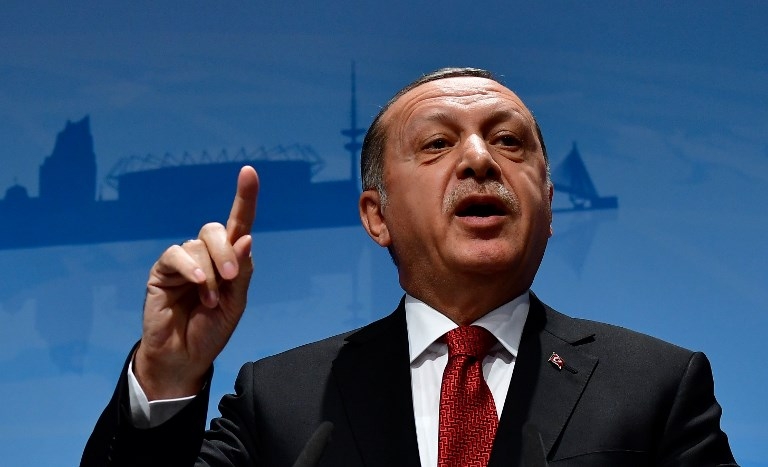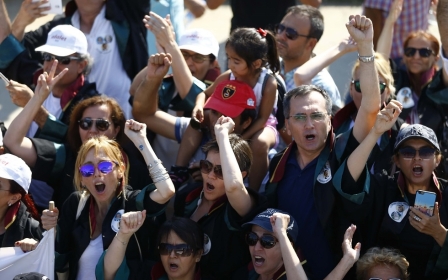'Vandals and terrorists': Erdogan slams jailed journalists

Turkey's president has refused to recognise his government's stifling of a free press and called scores of jailed journalists "criminals,” "terrorists" and "vandals," while also accusing any media that reports otherwise of "spreading lies”.
Recep Tayyip Erdogan's latest remarks came in an interview with the BBC, which is set to be broadcast in full on the eve of the anniversary of the 15 July failed coup.
No one is jailed because of journalism here
- Recep Tayyip Erdogan
"Please let's not fool the world with these lies,” Erdogan told the BBC, in response to a question about why more than 100 journalists are currently imprisoned.
"You are speaking more than me. You have more freedom than me. You are doing an interview with me but don't give me the opportunity to speak,” said Erdogan.
"No one is jailed because of journalism here. We have to acknowledge that."
"Opposition journalists write a lot of insulting articles about me. Even recently they did it during the [justice] march. Those insulting articles are still out there.”
Erdogan insisted that "only two” of these supposed journalists behind bars are valid press card holders.
"Those people who are jailed have no title as journalists. They have either worked with the terror organisation or were in possession of a firearm. Some even vandalised cash machines,” he said.
"They carry a card identifying them as journalists but they have no official press cards. There are only two actual journalists in jail now."
Offical press cards
Government press cards for Turkish citizens are issued after a long scrutinising process, which lasts years.
Many Turkish media workers do not have such cards, which also entitles the holder to free public transport and other benefits.
Between 153 to 170 journalists are currently in Turkish prisons, according to various international and local watchdogs. Turkey has been cited by the Committee to Protect Journalists as the country that has jailed the most journalists in the world - almost two-thirds of the global total.
While many are linked to publications that were owned and operated by the Fethullah Gulen movement in the past, the number of jailed journalists also include various pro-Kurdish writers and 12 staff from the staunchly secular Cumhuriyet newspaper.
Authorities hold Gulen, a US-based Turkish preacher, and his supporters in the state responsible for orchestrating last July's failed coup attempt.
Erdogan is granting interviews to selected foreign media as part of the commemorative events marking the quashing of the coup attempt.
Erdogan made the same remarks about journalists last month, which even drew a response from pro-government journalists.
Fatih Altayli, in a column in the Turkish HaberTurk newspaper, wrote that he has never had an official press card during his 35-year-long career and even attends presidential dinners as a journalist. He also explained why he has never applied for one.
A commission that is linked to a political office cannot decide whether I am a journalist
- Fatih Altayli, journalist
"A commission that is linked to a political office cannot decide whether I am a journalist. That is something only the newspaper I work at and a professional journalist organisation can decide.”
Erdogan maintained the same position on the jailed journalists and those who ask questions about it during his G20 meeting in Hamburg last week.
At a news conference, he also said 10 leading human rights activists arrested at a workshop were plotting a repeat of last year's failed coup attempt.
Erdogan said the charges stemmed from intelligence gathered by police.
Former state TV staff arrested
Meanwhile, detention warrants were issued on Wednesday for 34 former staff at the state-owned broadcaster TRT in an investigation targeting Gulen supporters, local media reported.
All 34 were suspected users of ByLock, an encrypted messaging app the government says was used by Gulen's followers.
They were previously dismissed due to alleged links to the putsch.
In a separate operation, police detained 14 non-commissioned army officers early on Wednesday in six provinces in an investigation into the coup attempt.
About 50,000 people have been jailed pending trial and some 150,000 state workers including teachers, judges and soldiers, have been suspended in the crackdown under emergency rule which was imposed soon after the attempted military takeover.
New MEE newsletter: Jerusalem Dispatch
Sign up to get the latest insights and analysis on Israel-Palestine, alongside Turkey Unpacked and other MEE newsletters
Middle East Eye delivers independent and unrivalled coverage and analysis of the Middle East, North Africa and beyond. To learn more about republishing this content and the associated fees, please fill out this form. More about MEE can be found here.




